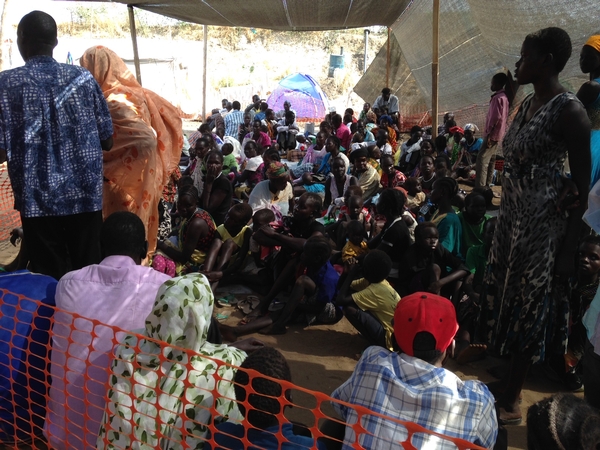There is really only one way to describe Tomping — exceptionally overcrowded.
It is one of the two compounds in Juba where Médecins Sans Frontières is running clinics for the estimated 40,000 people have sought refuge there. In Tomping camp — designed to hold just 4,000 people — more than 27,000 people live in a desperate environment, unable to return home.
When you drive into the camp, you see people living on the side of the road under bushes, trying to eke out a small space for themselves and their families. It’s clear this compound was never designed to be a displaced camp, nor to hold this number of people. People are crowded here in extreme heat, living in impossible conditions.
From a public health point of view, such crowded conditions are a ticking time bomb. Communicable diseases spread quickly in this kind of environment, especially with such inadequate sanitation. It is difficult to find space to build latrines and people are struggling to maintain basic hygiene. As a result, we see high numbers of diarrhoeal diseases in our clinic, which in this context can kill.
In an emergency the aim is to have one latrine for every 50 people. In Tomping there is one for every 150 people, not close to what is needed. There are many organisations on the ground doing their best and trying to find space and build more, but as soon as more are built, they’re full. The lack of space makes working here for all the humanitarian community extremely difficult.

Since our emergency team opened an outpatient clinic in Tomping camp on 22 December, we have treated more than 7,700 people, typically for diarrheal diseases, respiratory tract infections and malaria.
A few weeks ago we started to see more and more cases of measles, a viral disease that starts with red eyes, a runny nose and cough, and then a rash that begins to spread. Measles weakens the immune system, making children in particular very weak and susceptible to super-infections. In a camp setting it can spread quickly among young children and kill.
In response to this we set up a second facility to care for critically ill paediatric cases, with 24-hour high-level care. So far we’ve had 163 admissions, nearly all of whom are children under the age of five. Our paediatric ward has been operating at 150 per cent capacity since it opened, with half the cases presenting with measles, arriving in a very poor state of health.
Despite our very best efforts, we have lost 16 patients since the facility opened. We are now doubling the size of our paediatric ward and sending out community health teams to encourage people to bring their children to hospital much sooner, before they’re critically ill. The earlier they’re brought to hospital, the more lives we can save.
The main challenge we are facing is space. It’s the problem we all face in working in Tomping. Our clinic is about the size of a tennis court, where we regularly treat more than 200 patients per day. When the clinic is really busy in the early morning, there’s hardly space to walk through from one side to the other. Space is so valuable that people have set up little tents that line the fence around our clinic — that’s their home.
The heat is staggering and with such poor sanitation, children are contracting diarrhoea which leads to dehydration. One little girl who was brought to the paediatric ward was so dehydrated that her veins had collapsed. One of the MSF nurses, Anna, spent more than five hours with her, feeding her through a gastro tube, and though she began to revive slightly, it was too late and she sadly died later that night. We are very worried about the effect that the living conditions in the camp are having on people.
Living in such congested and harsh conditions, people are incredibly vulnerable to disease which makes each day a battle. The worrying part for me is that Tomping is only a fraction of the suffering of the more than 800,000 people who have been displaced from their homes across South Sudan. In spite of the recent ceasefire, conditions across the fledgling nation remain extremely poor.
Donate To New Matilda
New Matilda is a small, independent media outlet. We survive through reader contributions, and never losing a lawsuit. If you got something from this article, giving something back helps us to continue speaking truth to power. Every little bit counts.



